 Petzlover
Petzlover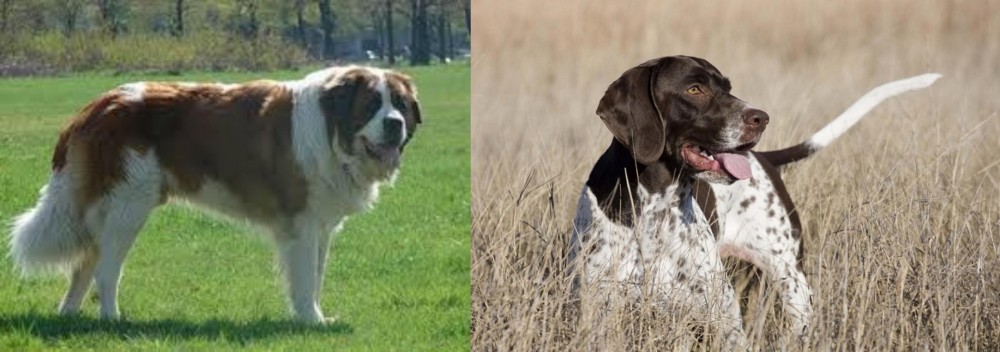 Moscow Watchdog is originated from Russia but Old Danish Pointer is originated from Denmark. Moscow Watchdog may grow 9 cm / 4 inches higher than Old Danish Pointer. Moscow Watchdog may weigh 33 kg / 73 pounds more than Old Danish Pointer. Moscow Watchdog may live 3 years less than Old Danish Pointer. Moscow Watchdog may have more litter size than Old Danish Pointer. Moscow Watchdog requires Moderate Maintenance. But Old Danish Pointer requires Low Maintenance
Moscow Watchdog is originated from Russia but Old Danish Pointer is originated from Denmark. Moscow Watchdog may grow 9 cm / 4 inches higher than Old Danish Pointer. Moscow Watchdog may weigh 33 kg / 73 pounds more than Old Danish Pointer. Moscow Watchdog may live 3 years less than Old Danish Pointer. Moscow Watchdog may have more litter size than Old Danish Pointer. Moscow Watchdog requires Moderate Maintenance. But Old Danish Pointer requires Low Maintenance
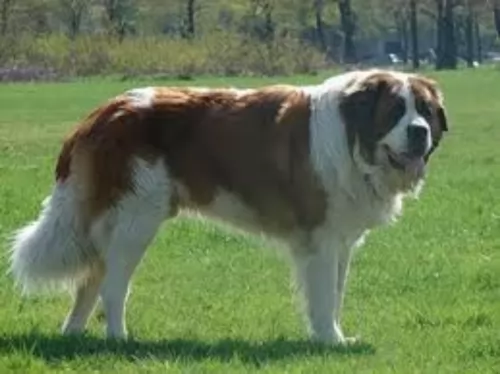 The Moscow Watchdog is a cross between the Caucasian Oytcharka, the St. Bernard and other Russian hound dogs. This large breed dog was developed in the Soviet Union for the purpose of being guard dogs. It had the awareness and assertiveness of the Oytcharka and the size, intelligence and attractiveness of the St. Bernard. The breed is common in Russia today but hardly seen anywhere else even though they were exported to the United States and Europe. The breed had the first U.S. born litter in 2015 and it is not AKC recognized.
The Moscow Watchdog is a cross between the Caucasian Oytcharka, the St. Bernard and other Russian hound dogs. This large breed dog was developed in the Soviet Union for the purpose of being guard dogs. It had the awareness and assertiveness of the Oytcharka and the size, intelligence and attractiveness of the St. Bernard. The breed is common in Russia today but hardly seen anywhere else even though they were exported to the United States and Europe. The breed had the first U.S. born litter in 2015 and it is not AKC recognized.
Following the second world war crime was on the rise in the Soviet Union and a new breed of dog was needed to counter this trend. The dog had to be adaptable to very cold temperatures, snowy weather and have a guard dog personality and ability. The breed was called on to guard such locations as railroads, government offices, warehouses, infrastructure and labor camps.
The project to develop this breed was led by General Medvedev beginning in 1946 at the Central School of Military Kynology – which was a department of the Soviet Ministry of Defense. It took many years to develop the Moscow Watchdog which then became a very successful breed.
It took until 1985 for the breed to be “officially” recognized in the Soviet Union and until 1992 to be recognized by the Federation of Dog Breeders in Russia and until 1997 for the standard to be approved by the Russian Kennel Club. They are still working with the FCI to gain international recognition for the breed. At the moment they are considered a part of the Molosser group and shown in the “Special Show” in Russia.
Committed breeders brought the Moscow Watchdog to Hungary in 1986 in order to make the breed more popular. In addition to this there were many breeders from previous Soviet States that wanted to preserve the breed as well. There were about 500 Moscow Watchdogs in Hungary around then. Currently there are about 27 Moscow Watchdogs in the United States. The breed is known to be a gentle giant and very much a family dog these days.
 Hailing from Denmark, the Old Danish Pointer originates back to 1710 and has been used as a pointing breed for finding game.
Hailing from Denmark, the Old Danish Pointer originates back to 1710 and has been used as a pointing breed for finding game.
Today they are essentially used as pet companions. Morten Bak mated local farm dogs with gypsy breeds, leading to the development of piebald purebred dogs. These were named Old Danish Pointers.
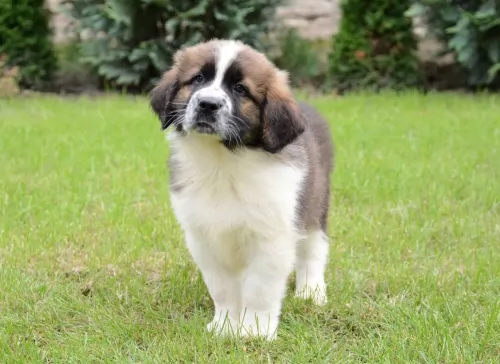 The Moscow Watchdog is related to the mountain dogs and is a very large breed. They are sturdy, muscular and powerful. They have big heads and a thick double coat that sheds profusely four times a year. They have a long tail, an arched chest and an air of confidence.
The Moscow Watchdog is related to the mountain dogs and is a very large breed. They are sturdy, muscular and powerful. They have big heads and a thick double coat that sheds profusely four times a year. They have a long tail, an arched chest and an air of confidence.
He is in the Mastiff family and is smart and trainable. He is not clumsy but has big bones. He is surprisingly agile and active for a dog his size. Unlike the St. Bernard he is not a couch potato. He is also differentiated from the St. Bernard because he does not drool.
These dogs are large but they’ve got a gentle temperament and are good with kids, being playful and energetic with them.
Even though he is a docile dog, you want him trained and socialized, and then he gets along well with other pets too. His sheer size makes it that it is best to supervise him when he’s around small children. He is also a protective dog breed, willing to bond closely to, and protect his human family.
 The Old Danish Pointer is a medium-sized, purebred dog standing at between 50 and 60cm in height and weighing between 26 and 35kg.
The Old Danish Pointer is a medium-sized, purebred dog standing at between 50 and 60cm in height and weighing between 26 and 35kg.
This beautiful dog is muscular and lean with a broad head, floppy ears and a long thin tail. The coat is smooth and short haired and is white with large reddish brown patches as well as some freckling.He is an average shedding dog.
He has dark brown eyes. He is amicable and gets on well with children in the home as well as with other dogs. Even so, it is best to have him trained and socialized as he becomes obedient and more amicable than he already is. If you decide to go in for breeding your dog, you can expect 4 to 6 puppies.
Quiet, calm and steady, the Danish Pointer is also stubborn, and this is why training and socialization is so important for him.
Outdoors and perhaps on a hunt he becomes highly animated and alive, but back home with his family he is a calm, loving, devoted family pet and loves spending time with his human family. He forms a close bond with his human owner and when he is well trained, he likes to please his owner.
He is intelligent too and finds learning new things easy.
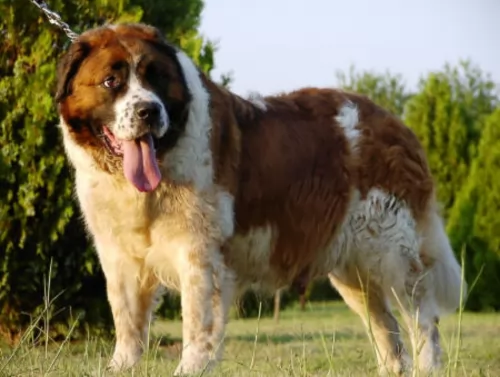 This is a large dog who likes to be involved and busy, even though he is so big. He isn’t suited to city life and being confined to a tiny garden as he needs space.
This is a large dog who likes to be involved and busy, even though he is so big. He isn’t suited to city life and being confined to a tiny garden as he needs space.
They’re independent dogs too and you can leave them alone during the day. He is social, so while you can leave them during the day while you’re at work, he’ll want your attention when you get back. They're such loving, loyal family pets that you owe it to him to make this gentle giant of a dog as happy as can be.
 Not only is the Old Danish Pointing Dog an excellent hunter, he is also friendly and loving when he is just being a pet.
Not only is the Old Danish Pointing Dog an excellent hunter, he is also friendly and loving when he is just being a pet.
These dogs are quiet, amicable pets enjoying the time they spend with their human family. He is low maintenance, he gets on well with children and other pets and he doesn’t spend his time barking endlessly at nothing.
When you take this well mannered, quiet, loving dog into your home, you can be prepared to have up to 14 brilliant years of companionship from him.
 Moscow Watchdog is looked upon as a fairly healthy dog breed but there are some risks such as hip dysplasia as well as some other large breed problems.
Moscow Watchdog is looked upon as a fairly healthy dog breed but there are some risks such as hip dysplasia as well as some other large breed problems.
With big dogs like this, hip dysplasia is a threat. Its an hereditary condition where the parent dogs pass down the problematic genes. Hip dysplasia results in inflammation and pain for your pet, and where once he loved to play, he is reluctant to and battles to get up after lying down.
 The Old Danish Pointer is a healthy dog and you’re not likely to be spending too much time at the vet with him.
The Old Danish Pointer is a healthy dog and you’re not likely to be spending too much time at the vet with him.
However there are always dog illnesses that you need to look out for, and hip dysplasia is always on the top of the list.
While this disease is more prevalent in larger dogs, it can strike smaller dogs too, and in fact dogs of any age. This is a condition where the hip joint doesn’t form properly, so that arthritis and inflammation sets in. It is very sad as you notice your once active dog becoming increasingly immobilized with pain and discomfort.
Eye infections can include entropion and ectropion – conditions where the eyelids irritate the surface of the eye.
Ear infections too, can cause your pet a lot of distress and he will shake his head and scratch his ears. Inside the ears, it will be red and possibly there will be a discharge. This is also more prevalent among dogs with floppy ears. The idea is to try and keep the inside of the ears clean and dry.
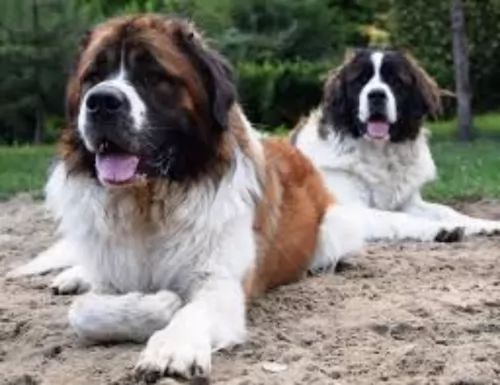 The Moscow Watchdog is a giant sized dog and will require a lot of regular exercise, and apart from a fairly brisk daily walk, will also need games and a run in the park.
The Moscow Watchdog is a giant sized dog and will require a lot of regular exercise, and apart from a fairly brisk daily walk, will also need games and a run in the park.
As a large dog requiring a regular dose of physical exercise as well as mental stimulation, he is better suited to life in the country or at least where there is a large garden.
The Moscow Watchdog has a medium length coat, and as a moderate shedder, you will need to simply brush his coat twice a week to remove loose hair. There is no professional grooming required for these dogs.
Homemade food is always a treat for a dog, but if you’re feeding your Moscow Watchdog commercially manufactured food because of the sheer convenience it provides, make sure the packaging says 'large- or giant dog breed' food. This way you know your pet is getting the right amount of minerals and vitamins for his size.
Always buy the best quality food to avoid giving your pet an overdose of colorants and preservatives. Try and give your pet some home-made food such as boiled chicken, some brown rice or pasta and some cooked vegetables such as sweet potatoes, carrots and spinach. These can be added to his kibble every now and again.
A simple diet like this agrees with your pet and he will be healthy and happy with his lot.
 With his short coat, the Old Danish Pointer is looked upon as a low maintenance breed. You can brush him twice a week and at the same time check him over for fleas and ticks, ear and eye infections as well as dental infections.
With his short coat, the Old Danish Pointer is looked upon as a low maintenance breed. You can brush him twice a week and at the same time check him over for fleas and ticks, ear and eye infections as well as dental infections.
Check his nails too, as many dogs have been injured when their long nails have hooked onto things and ripped open the flesh. When he gets used to it, your pet will find these grooming sessions therapeutic and relaxing, loving the bonding time you spend with him.
Your beautiful Old Danish Pointer loves to spend time outdoors and he is far better suited to life in the countryside and in the suburbs as opposed to life in the city. Give him the chance to take part in a hunt, and he’ll relish it. He also loves long walks where he can even perhaps be let off the leash as well as the chance to go swimming. He is at his happiest when he is tired at the end of the day from hiking, running, swimming and camping.
You can conveniently feed your Old Danish Pointer from the top quality commercially manufactured foods. Just be sure to check the labeling as you want to be sure he gets in the right amount of vitamins and minerals and avoids those foods high in colorants, preservatives and useless fillers.
Keep your dog’s diet simple and nutritious and try to add in some homemade food to his kibble from time to time. Boiled chicken, brown rice or pasta and some cooked vegetables such as sweet potatoes, spinach and carrots will keep him healthy and active. You can also try to include some raw meat occasionally.
Make sure he always has access to cool, fresh drinking water.